Marcia Thornton Jones's Blog, page 115
July 8, 2018
HERO -- by Jane Kelley
We all know about The Hero's Journey. I try to follow the stages when I plan tortures -- I mean challenges for my characters. Call to adventure! Challenges and temptations! Abyss! Atonement! Triumphant Return!
But today I want to write about a real hero I know. My friend Alice.
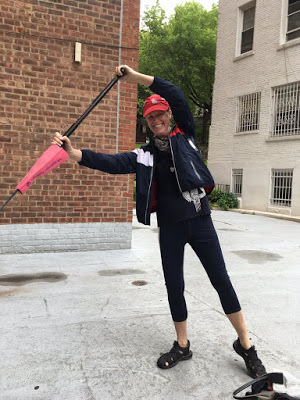
Alice battles cancer. She fights those insidious cells inside her own body. You can't tell it from this picture. She has a bright smile and an elegant stance. She's holding an object that you wouldn't think of as a weapon, but it is. It's a training paddle because Alice also fights by racing in a dragon boat.

The paddling is important. It strengthens muscles and self images. The team is important. There are many people pulling together to accomplish the goal. The drummers are important. They keep the racers focused and unified. The dragon at the prow is important. Dragons are mythical, magical, fire-breathing creatures. Dragons are also fierce.
Alice has always been a runner. She has raced in many New York City marathons and crossed that finish line all by herself. Now she is deriving strength from being on a team with these women because they are all battling.

And today, July 8th, they will be racing in Florence, Italy. Over three thousand participants have come from all around the world -- from Argentina to New Zealand. They race as part of the International Breast Cancer Paddler's Commission to show the world and themselves that they are not the victims of malignant cells. They are heroes.
I will be there as part of another team of friends and family to cheer Alice and all the women as they glide over the Arno River, under the Ponte Vecchio, and cross the finish line.
They will triumph just by taking part in the race.
But today I want to write about a real hero I know. My friend Alice.

Alice battles cancer. She fights those insidious cells inside her own body. You can't tell it from this picture. She has a bright smile and an elegant stance. She's holding an object that you wouldn't think of as a weapon, but it is. It's a training paddle because Alice also fights by racing in a dragon boat.

The paddling is important. It strengthens muscles and self images. The team is important. There are many people pulling together to accomplish the goal. The drummers are important. They keep the racers focused and unified. The dragon at the prow is important. Dragons are mythical, magical, fire-breathing creatures. Dragons are also fierce.
Alice has always been a runner. She has raced in many New York City marathons and crossed that finish line all by herself. Now she is deriving strength from being on a team with these women because they are all battling.

And today, July 8th, they will be racing in Florence, Italy. Over three thousand participants have come from all around the world -- from Argentina to New Zealand. They race as part of the International Breast Cancer Paddler's Commission to show the world and themselves that they are not the victims of malignant cells. They are heroes.
I will be there as part of another team of friends and family to cheer Alice and all the women as they glide over the Arno River, under the Ponte Vecchio, and cross the finish line.
They will triumph just by taking part in the race.
Published on July 08, 2018 03:00
July 5, 2018
Revising One Page at a Time by Deborah Lytton
My favorite thing to do when I am in the middle of a work-in-progress is to begin each writing session by reviewing the pages I have already written. It is the best way for me to quickly connect with the moment I last left off and continue right on. However, it is also an opportunity to revise those same pages. And revise and revise. Sometimes this can turn my whole writing session into a rewriting session. When this happens, my page count does not increase because I have not actually moved forward at all. In truth, the more time I spend revising those first pages, the better the manuscript becomes. It was in spending hours and hours (and months and months) on the first thirty pages of my YA SILENCE, that I found the voices of the characters and the dual POV structure that gave the manuscript its heart.
 Even though the benefits of this style of working can be enormous, there are also downsides. The most obvious one is that spending time revising first pages can keep me from meeting my personal deadlines. So I have recently broken myself of this habit by only allowing myself to read the scene just prior to the place I left off. This way, my revising is limited and I can move forward with the first draft, knowing that there will be plenty of time for me to enjoy revising (and more revising) later. So my tip is to ask yourself what habits are keeping you from meeting your personal page goals. See if you can change them even a little bit. Writing one page every day will lead you closer to your goal. Try to make that one page happen today!
Even though the benefits of this style of working can be enormous, there are also downsides. The most obvious one is that spending time revising first pages can keep me from meeting my personal deadlines. So I have recently broken myself of this habit by only allowing myself to read the scene just prior to the place I left off. This way, my revising is limited and I can move forward with the first draft, knowing that there will be plenty of time for me to enjoy revising (and more revising) later. So my tip is to ask yourself what habits are keeping you from meeting your personal page goals. See if you can change them even a little bit. Writing one page every day will lead you closer to your goal. Try to make that one page happen today!
 Even though the benefits of this style of working can be enormous, there are also downsides. The most obvious one is that spending time revising first pages can keep me from meeting my personal deadlines. So I have recently broken myself of this habit by only allowing myself to read the scene just prior to the place I left off. This way, my revising is limited and I can move forward with the first draft, knowing that there will be plenty of time for me to enjoy revising (and more revising) later. So my tip is to ask yourself what habits are keeping you from meeting your personal page goals. See if you can change them even a little bit. Writing one page every day will lead you closer to your goal. Try to make that one page happen today!
Even though the benefits of this style of working can be enormous, there are also downsides. The most obvious one is that spending time revising first pages can keep me from meeting my personal deadlines. So I have recently broken myself of this habit by only allowing myself to read the scene just prior to the place I left off. This way, my revising is limited and I can move forward with the first draft, knowing that there will be plenty of time for me to enjoy revising (and more revising) later. So my tip is to ask yourself what habits are keeping you from meeting your personal page goals. See if you can change them even a little bit. Writing one page every day will lead you closer to your goal. Try to make that one page happen today!
Published on July 05, 2018 15:01
July 3, 2018
Writers, Stop Comparing Yourself to Others
 Ours is a competitive industry. And even though I have found the world of kidlit to be generally friendly and supportive, the truth is that there are a LOT of us writing and hoping to fill a limited number of slots in the publishers' catalogs (or awards lists or school visit budgets or whatever). So it can be easy to get caught up in comparisons: x book got a bigger advance, y book sold more copies, z book was named to Random Awesome Book List (and my book wasn't).
Ours is a competitive industry. And even though I have found the world of kidlit to be generally friendly and supportive, the truth is that there are a LOT of us writing and hoping to fill a limited number of slots in the publishers' catalogs (or awards lists or school visit budgets or whatever). So it can be easy to get caught up in comparisons: x book got a bigger advance, y book sold more copies, z book was named to Random Awesome Book List (and my book wasn't).All one has to do to get mired in the Competitive Swamp is to visit Twitter or go to a conference or talk to another writer in the industry, and there it is, right in your face: someone else who's doing better than you. Which is
1. crazy talk
2. crazy-making
3. creativity-killing
4. depressing
5. insane
I know because I've been there. Lots of times! It's been my #1 bad habit as a writer.
But. NO MORE! I'm very deliberate these days about how much I expose myself to social media (which is a hotbed of comparison-crazy-making!). As an introverted person I kind of keep my head down anyway and don't do Facebook or Instagram at all, and Twitter only inconsistently.
But mostly I don't worry so much about what others are doing because I keep busy with my own books/life/dreams. The only real thing we have control over in this business is the words we put on the page. So these days that's where I keep my focus. Amazingly, this has freed me to celebrate not only my own successes, but those of others.
We may be in a competitive industry, but I'm the only ME in it -- and you're the only YOU.
Which makes James Bay's song “Let It Go” pretty much perfect. Listen for these lines “why don't you be you and I'll be me.” And have yourself a fabulous 4th of July!
----------------
Irene Latham is an Alabama author of more than a dozen current and forthcoming poetry, fiction and picture books for children and adults, including Leaving Gee's Bend, 2011 ALLA Children's Book of the Year and Can I Touch Your Hair? Poems of Race, Mistakes and Friendship (with Charles Waters). Winner of the 2016 ILA Lee Bennett Hopkins Promising Poet Award, she also serves as poetry editor for Birmingham Arts Journal.
Published on July 03, 2018 03:30
July 2, 2018
Break It! By Ann Haywood Leal
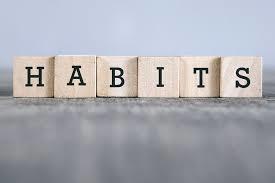
Why is it that they are so easy to form and so hard to break? . . . Bad ones, that is.
It may sound a bit simplistic, but when it comes to bad writing habits, I like to think of opposites.
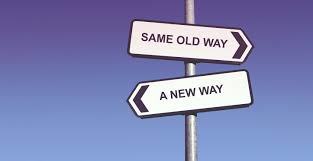 One of my bad writing habits is not getting started right away. I'll try to get everything else done (including cleaning the cat box and washing every last dish), and THEN I'll get started on my writing. Is it that necessary to do that online jigsaw puzzle? And I'm pretty sure the New York Times isn't going anywhere any time soon, and social media is most likely here to stay.
One of my bad writing habits is not getting started right away. I'll try to get everything else done (including cleaning the cat box and washing every last dish), and THEN I'll get started on my writing. Is it that necessary to do that online jigsaw puzzle? And I'm pretty sure the New York Times isn't going anywhere any time soon, and social media is most likely here to stay. So I tried out my theory of opposites. (By the way, it's so much easier to dish out "wise" advice than to take it yourself, isn't it??) I actually got started right away--first thing in the morning, I opened my computer and got going with my writing. (Full disclosure: I did get myself some coffee, first.)
I'd love to tell you that it went totally without a hitch; I wrote five chapters in one hour and my fingers were literally flying across the keys. But . . . the reality of it all is that a mild form of what could only be panic set in: WHAT IF IT'S SOMEONE'S BIRTHDAY AND IT'S ALREADY SEVEN A.M. AND I HAVEN'T YET WISHED THEM A HAPPY BIRTHDAY ON FACEBOOK?! WHAT IF THERE'S A REALLY CUTE DOG PICTURE ON INSTAGRAM AND EVERYONE WILL BE TALKING ABOUT HOW CUTE IT IS AND IT WILL HAVE ALREADY DISAPPEARED INTO INSTAGRAM OBLIVION WITHOUT MY "LIKING" IT?! . . . and so on.
But as my de-habiting morning and days went on, that voice started to get quieter, and I actually did get a whole lot of writing done, including this blog post.
Some "experts" say that it takes 21 days to break a bad habit; some say a whopping 30. But think about how much more writing you will have gotten done in those weeks!

Published on July 02, 2018 14:42
June 29, 2018
The 'Best' Advice?
By Charlotte Bennardo
So our theme this month is the best advice we've gotten (and passing it along to you.)
Write what you knowSBICAW (Sit Butt in Chair and Write) Write it first, revise later.Write what interests you.Don't write other people's storiesWrite every day
There is a ton or more of advice about writing: not using cliches, use active verbs, don't overuse dialog tags, etc. All these are great points for writer, but the piece of advice I give when asked, and what I live by, is:
WRITE NOW.
There's no "Some day when..." because somehow that someday never arrives. I've heard uncountable excuses, reasons, and stories why people who want to write can't. It's b.s. I wrote my first novel during my lunch break when I was working full time, going to school at night, was married, and had a home to take care of. When the kids came along, I wrote during soccer/baseball/taekwondo/fencingpractice. I snuck in sentences while waiting for the cable guy/plumber/appliance repairman. After dinner, I stole a few minutes to jot down some words.
Why not make a time line of your routine and schedule writing time, even if it's only in 15 minute blocks? You make time for manicures or a night at the ballpark; you can block off some time to write, and those 15 minute blocks can add up.
And here's my advice: channeling my inner Kate Beckinsale from the movie Von Helsing when a vampiress yammers on about killing her, but Kate slides the stake in while said vampiress is waxing poetic instead of killing:
IF YOU'RE GOING TO WRITE, DO IT AND STOP TALKING ABOUT IT!
So our theme this month is the best advice we've gotten (and passing it along to you.)
Write what you knowSBICAW (Sit Butt in Chair and Write) Write it first, revise later.Write what interests you.Don't write other people's storiesWrite every day
There is a ton or more of advice about writing: not using cliches, use active verbs, don't overuse dialog tags, etc. All these are great points for writer, but the piece of advice I give when asked, and what I live by, is:
WRITE NOW.
There's no "Some day when..." because somehow that someday never arrives. I've heard uncountable excuses, reasons, and stories why people who want to write can't. It's b.s. I wrote my first novel during my lunch break when I was working full time, going to school at night, was married, and had a home to take care of. When the kids came along, I wrote during soccer/baseball/taekwondo/fencingpractice. I snuck in sentences while waiting for the cable guy/plumber/appliance repairman. After dinner, I stole a few minutes to jot down some words.
Why not make a time line of your routine and schedule writing time, even if it's only in 15 minute blocks? You make time for manicures or a night at the ballpark; you can block off some time to write, and those 15 minute blocks can add up.
And here's my advice: channeling my inner Kate Beckinsale from the movie Von Helsing when a vampiress yammers on about killing her, but Kate slides the stake in while said vampiress is waxing poetic instead of killing:
IF YOU'RE GOING TO WRITE, DO IT AND STOP TALKING ABOUT IT!
Published on June 29, 2018 06:00
June 25, 2018
KEEP GOING (HOLLY SCHINDLER)
It took seven years to sell my first book. Back then, I used to think that if I just sold one, everything would change. I'd be "in" the industry. I pictured it as one giant hurdle I needed to scale, and once I got over it, the hard stuff would mostly be over.
I'll wait a minute while you finish laughing...
Okay, we all know that life doesn't magically change because you sell one book--or ten. It doesn't change once you get awards. You still have daily ups and downs, rejections, disappointments.
Just keep going.
And having a popular or well-received book doesn't magically change the world, either. The next book might get negative reviews. It might not sell.
Just keep going.
You have bad interviews that don't go your way. Your publisher doesn't push your work. You might feel overlooked. Wonder if your readers are out there.
Just keep going.
Because here's the thing: underneath all the disappointments and the nearly-non-existent paychecks, underneath the rejection and the struggle, there's this:
There is just nothing in this world--nothing--that is quite like sortytelling. There is nothing like writing and literature and reading. It's something I don't want to ever, ever, ever lose.
So I keep going.
I'll wait a minute while you finish laughing...
Okay, we all know that life doesn't magically change because you sell one book--or ten. It doesn't change once you get awards. You still have daily ups and downs, rejections, disappointments.
Just keep going.
And having a popular or well-received book doesn't magically change the world, either. The next book might get negative reviews. It might not sell.
Just keep going.
You have bad interviews that don't go your way. Your publisher doesn't push your work. You might feel overlooked. Wonder if your readers are out there.
Just keep going.
Because here's the thing: underneath all the disappointments and the nearly-non-existent paychecks, underneath the rejection and the struggle, there's this:
There is just nothing in this world--nothing--that is quite like sortytelling. There is nothing like writing and literature and reading. It's something I don't want to ever, ever, ever lose.
So I keep going.
Published on June 25, 2018 05:30
June 22, 2018
Smack Dab in the Imagination: Imagination, Reverie, and Originality by Dia Calhoun
Imagination is, of course, all about images. As an author, and even more so as a poet, images are the powerhouses of my work. So how do creatives tap into a free-flowing well of images from the imagination?
It’s all about the unconscious.
As a developing species, humans perceived and processed the world in images long before we had language. A tree was a an image long before it became a word. The deeper layers of the brain still retain that way of perceiving the world. A creative artist who wants access to those images in original and free flowing ways, needs to tap her unconscious mind.
For many years I envisioned a tunnel from consciousness to the unconscious well. Now, I know there is not one, but hundreds of tunnels, some big, some small, some straight, some twisting, still others in spirals. Now I envision a sphere with many tunnels on the surface all reaching down to the Great Well at the center. Usually many of these tunnels are active at once. We just aren't aware of them.
One way that I tap into these tunnels is through semi-conscious reverie. Sometimes I do this right after waking. I drift in that state and hold an image, often from a dream, in my mind. Then I start describing it by speaking directly into a note on my phone, recording whatever comes out. Sometimes I grab a pencil and paper. Something about speaking though, allows me to stay in the creative drifting reverie more easily. I don’t edit in any way what I say or write. I allow myself to stop and start as the words an images come and go--no forced, timed writing.
Sometimes this process turns symphonic. I will say a phrase over and over, building on it, repeating with variations. Sometimes it’s pure rhythm. Only later, after breakfast, do I go back over this. First I read it aloud, then begin editing. I always preserve the original. This process has lead to some of my most original writing.
Why not try it yourself?
Published on June 22, 2018 23:10
June 20, 2018
Writers READ
The best piece of advice I'm able to offer would-be writers can be summed up in one word: READ. For me, reading was the key.
First, reading inspired me to want to become an author in the first place. The books I fell in love with as a young reader like Henry Huggins by Beverly Cleary and Little House on the Prairie by Laura Ingalls Wilder planted the author seed in me even before I knew I wanted to write. Later as an elementary school teacher, the books I read aloud to my third graders like The Hundred Dresses by Eleanor Estes and The Tiger Rising by Kate DiCamillo caused that author seed to grow, and my dream was born. But simply having the dream to write a book doesn't necessarily make it happen. As would-be authors often do, I spent many years collecting rejection letters, but it was my continued passion for reading, especially reading middle grade books, that taught me what I needed to know about what a story really must be in order for it to become a book. Every book I've ever read, the ones I've loved, as well as the ones I haven't enjoyed all that much, were examples of how "story" actually works. It was all those examples that allowed me to finally take one of my works-in-progress to the level necessary to achieve that sought-after acceptance letter instead of another rejection.
So, my best advice: Spend time reading to unlock creative inspiration as well as gain wonderful examples of the essentials needed to write a great story.
Happy Writing and Reading,
Nancy
First, reading inspired me to want to become an author in the first place. The books I fell in love with as a young reader like Henry Huggins by Beverly Cleary and Little House on the Prairie by Laura Ingalls Wilder planted the author seed in me even before I knew I wanted to write. Later as an elementary school teacher, the books I read aloud to my third graders like The Hundred Dresses by Eleanor Estes and The Tiger Rising by Kate DiCamillo caused that author seed to grow, and my dream was born. But simply having the dream to write a book doesn't necessarily make it happen. As would-be authors often do, I spent many years collecting rejection letters, but it was my continued passion for reading, especially reading middle grade books, that taught me what I needed to know about what a story really must be in order for it to become a book. Every book I've ever read, the ones I've loved, as well as the ones I haven't enjoyed all that much, were examples of how "story" actually works. It was all those examples that allowed me to finally take one of my works-in-progress to the level necessary to achieve that sought-after acceptance letter instead of another rejection.
So, my best advice: Spend time reading to unlock creative inspiration as well as gain wonderful examples of the essentials needed to write a great story.
Happy Writing and Reading,
Nancy
Published on June 20, 2018 04:30
June 19, 2018
Best advice I’ve received as a writer
Commercial.
Likable characters.
Ground-breaking.
High concept.
There are a lot of terms a writer will read about in publishing when if they start down that path to see their manuscript become a bound novel.
Love.
If one writes for the market – to be commercial, or try to hit a trend, there’s likely to be a fair amount roadblocks and letdowns, I’ve found.
If one writes not for the market, but for oneself, ones love of the craft and love of the literary world, they won’t fail.
For me, writing and publishing have had to be two different worlds.“You’ll always love writing, but you’ll grow to hate publishing.” At times, this has been true. Publishing isn’t out to eat your heart, but it is a competitive business. To be an author, you have to be pretty okay with hearing the word “no.” Rejections are the norm.
It only takes one “yes,” however. If you keep knocking on doors, however, eventually you’ll hear an enthusiastic “yes.”
Whether it’s for a novel, a blog post, a poem, a short story, it only takes one yes in that sea of no’s to keep you going and heading towards your goal – whatever that may be.
I don’t personally continue to write as I think I’ll hit the best-seller list one day. I don’t write trends, or commercial or what I think will sell to the next big agent or publishing house. I write what’s in my mind, and in my heart, and what I’m passionate and motivated for.
Don’t get me wrong, I’d certainly love to hit that best-seller list.
But at the end of every single day, I write for myself. I write because I love to write. I write because it makes me feel whole. Like I have a voice and a place in the world. There are many, many places for a writer to find their community. It may be online, or in the local newspaper, on a private blog or a public one. In a magazine or literary magazine.
Never give up.
And always keep writing.
For you.
That’s the best advice I’ve ever been given in this world.
“Keep writing for you.”
Happy reading!
Published on June 19, 2018 17:22
June 18, 2018
Facing It
My sister posts a quotation from some famous person every day on Facebook, in honor of that person's birthday. Writer Joseph Conrad was born on December 3, 1857, so one December 3 my sister posted this line from him, which has become one of my favorite pieces of writing advice: "Facing it - always facing it - that's the way to get through."
It's so simple. And so true.
My biggest problem with any writing project - actually, with all projects and with everything in my entire life - is just this: facing it. I build up dread to the point of incapacity. Maybe, in the end, that's all writer's block is: a refusal to face what needs to be faced.
The strange and wonderful thing is that as soon as I face something - just sit down at my writing tablet or computer and spend TEN SECONDS staring at it - the rest is relatively easy. All I need to to is get over that first hump. That's all. And yet getting over that first hump can seem impossible.
So what I've started doing for any daunting task in my month's massive writer's to-do list is to add, as an extra to-do item, "Face [task x]" (whatever it is). As the facing takes just ten seconds (well, to be fair, probably more like five minutes), it's low-hanging fruit if I need the satisfaction of crossing at least something off the list. From that point, momentum takes over, and I'm all set. Hooray!
I tell the world, with some frequency, how I rely on a cherished hourglass to accomplish my day's stint of writing. Here it is.
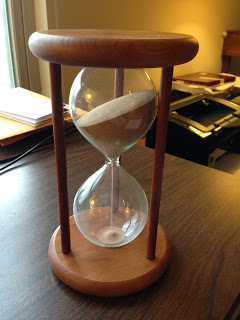 For some tasks, however, even working on them for a mere hour is more than I can bear, so I also have a half-hour glass (it looks similar, just a tiny bit smaller). Then this past week a student who knew my fondness for hourglasses gave me a "travel" one, which is actually an eight-minute timer in a small sturdy cardboard case. Behold!
For some tasks, however, even working on them for a mere hour is more than I can bear, so I also have a half-hour glass (it looks similar, just a tiny bit smaller). Then this past week a student who knew my fondness for hourglasses gave me a "travel" one, which is actually an eight-minute timer in a small sturdy cardboard case. Behold!
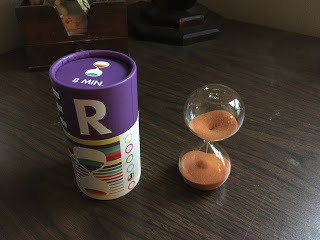 I don't think I'll take it with me on trips, though. Instead I'm going to save it for when I can't face even half an hour of work on some scary writing project, when eight minutes seems about all I can handle.
I don't think I'll take it with me on trips, though. Instead I'm going to save it for when I can't face even half an hour of work on some scary writing project, when eight minutes seems about all I can handle.
Then I'll turn over my adorable, teensy-weensy, itty-bitty, baby hourglass (cute is good for terror-defusing purposes). How scary can it be to work on this task for eight measly minutes?
Voilà! Eight minutes later, the task will have been FACED, which was all I needed.
Because facing it, just facing it, is the way to get through.
It's so simple. And so true.
My biggest problem with any writing project - actually, with all projects and with everything in my entire life - is just this: facing it. I build up dread to the point of incapacity. Maybe, in the end, that's all writer's block is: a refusal to face what needs to be faced.
The strange and wonderful thing is that as soon as I face something - just sit down at my writing tablet or computer and spend TEN SECONDS staring at it - the rest is relatively easy. All I need to to is get over that first hump. That's all. And yet getting over that first hump can seem impossible.
So what I've started doing for any daunting task in my month's massive writer's to-do list is to add, as an extra to-do item, "Face [task x]" (whatever it is). As the facing takes just ten seconds (well, to be fair, probably more like five minutes), it's low-hanging fruit if I need the satisfaction of crossing at least something off the list. From that point, momentum takes over, and I'm all set. Hooray!
I tell the world, with some frequency, how I rely on a cherished hourglass to accomplish my day's stint of writing. Here it is.
 For some tasks, however, even working on them for a mere hour is more than I can bear, so I also have a half-hour glass (it looks similar, just a tiny bit smaller). Then this past week a student who knew my fondness for hourglasses gave me a "travel" one, which is actually an eight-minute timer in a small sturdy cardboard case. Behold!
For some tasks, however, even working on them for a mere hour is more than I can bear, so I also have a half-hour glass (it looks similar, just a tiny bit smaller). Then this past week a student who knew my fondness for hourglasses gave me a "travel" one, which is actually an eight-minute timer in a small sturdy cardboard case. Behold! I don't think I'll take it with me on trips, though. Instead I'm going to save it for when I can't face even half an hour of work on some scary writing project, when eight minutes seems about all I can handle.
I don't think I'll take it with me on trips, though. Instead I'm going to save it for when I can't face even half an hour of work on some scary writing project, when eight minutes seems about all I can handle.Then I'll turn over my adorable, teensy-weensy, itty-bitty, baby hourglass (cute is good for terror-defusing purposes). How scary can it be to work on this task for eight measly minutes?
Voilà! Eight minutes later, the task will have been FACED, which was all I needed.
Because facing it, just facing it, is the way to get through.
Published on June 18, 2018 04:33



